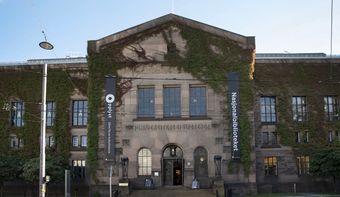The Local History Wiki
The Local History Wiki was established between 2007 and 2008 by The Norwegian Institute of Local History. The wiki started up in cooperation with some of the administrators of Wikipedia.
| The Norwegian Institute of Local History | |
|---|---|

| |
| The National Library in Oslo, where The Norwegian Institute of Local History is situated. Photo: The National Library, 2020. | |
| The Norwegian Institute of Local History was established in 1956. Just after the celebration of 60 years as an independent institution, the institute became a section of The National Library from 2017.
The chief purpose of the institute is to promote and develop local and regional history in Norway. We have our own research projects, and we perform counselling services for external projects. We arrange conferences as well as practical courses, and we take part in The National Library’s publication program. We currently (2020) hold nine permanent positions. For the last twelve years, we have promoted production, dissemination and exchange of knowledge through The Local History Wiki. We also canalize parts of our counselling services and some of our projects through the wiki. | |
The institute had several motivations. On the one hand, we had an encyclopaedia, or dictionary, with useful terms for historians, which was published in print and needed supplementing. On the other hand, we saw a need for gathering similar local history sites under one roof. Furthermore, we saw an opportunity for letting historians “export” encyclopaedic content from their parish histories to the wiki, in order to cultivate the narrative, the reading function of these books.
Special features
For the most part, The Local History Wiki consists of encyclopaedic articles. In addition, we have a source repository consisting of personal stories, interviews, letters and so forth. To help our contributors in the writing process, we also have counselling articles. Furthermore, we have bibliographies and overviews covering different kinds of literature and sources. Our images are stored within the wiki, not on an external platform, like Wikimedia Commons.
Nothing is too small
Even though the theme – and the perspective – is local and regional history, topics of national interest are also welcome, as the global, national, regional and local levels influence each other mutually. That said, our policy is that no subject is too small or insignificant for the wiki, if sources – written or oral – are available.
To be able to write about a baby who died three days old or about a long-gone weaver, you need to use primary sources. We do not only permit original research, we encourage it. In Norway, many historical sources are digitized, the greatest actors being The National Library, The National Archives and The Digital Museum. In the wiki, we use unique identifiers (LOD) to link to these sources, and we have made it easy for them to link back to the wiki.
Let everyone join as contributors!
The wiki is an arena for co-creation and cooperation. The users may co-write one specific article, or the cooperation may be expanded to a collection of articles, a project and even the whole wiki. Many of our projects have focused on the wiki infrastructure, like entering coordinates in articles and replacing names of administrative units due to municipal reforms.
Ideally, “everyone” should participate as content providers, for the many voices to be represented. Unfortunately, we are not there yet. As part of a research project about our wiki,[1] a survey was carried out among all contributors registered by 2018. Out of 740 respondents three quarters were male. Equally, three quarters were aged 51 years or older, and more than 80 percent held a university degree (not only in history).
The wiki community
Since imbalances in the user group may be reflected in the topics covered, the institute’s administrators are constantly on the lookout for biases, as they go through last edits. Furthermore, we organize cooperation events each month and even more extensive projects, partly to draw attention to areas with weak coverage. This year our overall focus has been on diversity and inclusion. This applies both for the content and the user side.
The wiki is not just a collection of material, but also a community. All articles and images have discussion pages connected to them. And since wiki writing is a collective matter, you can get “a little help from your friends”. Be it on the topic, the sources or linguistic issues.
Laboratory and process
In general, we have high tolerance for different ways of doing things. Contributors are given the chance to try and fail - to learn by doing. We are also open for experiments - with local history genres for example.
Whereas our tolerance for issues that are part of a process is high, it is equally low for unproductive quarrels and attacks on persons. Therefore, we follow the wiki’s discussions closely. As we do with all actions that can cause imbalance in the wiki community – and even outside it.
Privacy and copyright
All users are responsible for their own contributions to the wiki. All articles and images are published under a creative commons or public domain license. When you register, you must fill in a form and state that you will follow the laws on privacy and copyright. The institute also has a certain editorial responsibility.
In addition to our own staff, the institute is fortunate to have a corpse of administrators who work voluntarily, outside the institute’s working hours. This gives us an assurance that there is always someone on the watch – both to follow up users who need help and to prevent vandalism.
References
- ↑ Henningsen, Erik og Håkon Larsen: The Joys of Wiki Work: Craftsmanship, Flow and Self-externalization in a Digital Environment. In: Libraries, Archives and Museums as Democratic Spaces in a Digital Age. De Gruyter Saur, 2020. Pages 345–362.